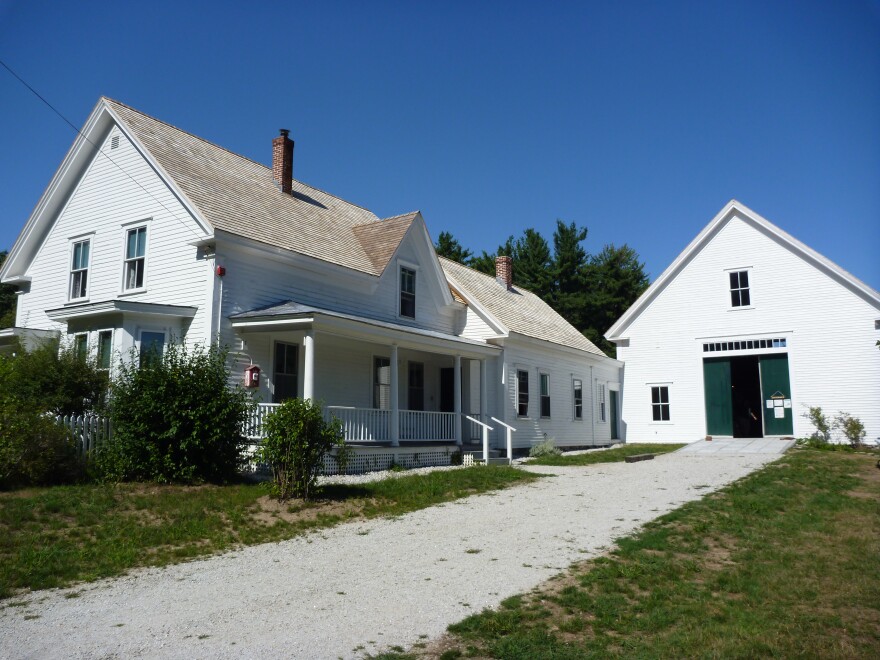Robert Frost is often praised for the colloquialism of his poetry. His work is accessible, exploring complex ideas through scenes and images of rural life. Though he came to typify the region, Frost was not born in New England.
His first years were spent in San Francisco, and his adolescence in Lawrence, Mass. In fact, frost didn’t discover rural life until his short-lived attendance at Dartmouth College. But New Hampshire stuck.
Though he would become Vermont’s poet laureate and the nation’s Pulitzer Prize winner, a teacher at Middlebury College and a snowbird in Florida, the Granite State served as the backdrop for much of his early work.
For 11 years, Frost and his family lived at a small farm in Derry. It was there that he found his poetic voice and discovered that he wasn’t much of a poultry farmer. May through October, you can tour the white clapboard house where Frost wrote many of the poems in A Boy’s Will and North of Boston. You can attend readings, lectures, and a poetry conference in the summer, and year-round the grounds are open to exploration -- walking alongside Hyla Brook, and wandering the orchard and meeting the subject of Frost’s Mending Wall.

After selling the farm in Derry, the Frosts left for Great Britain. It was there that Frost published his first volumes of poetry. The family returned to the U.S. when World War I began, and settled on another New Hampshire farm, this one farther north, in Franconia.
Maudelle Driscoll, Executive Director of what is now called The Frost Place, explains that Frost lived in Franconia full-time from 1915 to 1920, and continued to return every summer until his wife died. The house is now a museum and poetry center designed to reflect and honor Frost’s legacy.
Driscoll describes the view with a kind of awe, "The road runs along a ridge and you look from the windows of the house down into the eastern valley," she explains, "with the Franconia range and with Mount Lafayette and Cannon. The fog comes in through that notch and he called that the dragon entering. It’s one of -- you look out and the alpenglow sets on those mountains almost every day. It’s just absolutely stunningly beautiful."

Driscoll says that it’s difficult to know exactly which poems Frost wrote during his time in Franconia. What is known is that, in committing quintessential New England to the page, Frost had to bend rural tradition.
"People had a lot to say about Frost. Frost trained his cow to be milked at 12 and midnight. And he kept a different set of hours and different set of priorities than the people around here and one of the things that he said is that you have to be sort of a bad farmer to be a good writer. And you can’t be too good at anything that‘ll take your mind away from writing."
Though Frost would eventually leave Franconia to teach and write in Vermont, Michigan, and Massachusetts, his time at the farm left its mark. The town bought the small home in 1977, and established the Frost Place. From the get-go, it was intended to foster poetry in the community. Driscoll emphasizes the importance of accessibility in poetry, of eschewing academic removal and making the work available to the community.
That accessibility extends to the Frost Place’s poet in residence, who shares their quarters with the museum, and presents readings of their work to the public.
"Last year," Driscoll says, "when the poet came, one of the neighbors from down the road brought a mason jar with flowers in it and welcomed them. The town welcomes them, they do a reading at the town library. And that first year, they left firewood on the porch and bought pie. They’re really the town poet of Franconia. I can’t tell you how Frost was welcomed. I can tell you that the poet in residence walks up that road to Franconia and has dinner in people’s houses and reads at the museum and swims in the brook."
Working as Frost did is the privilege of the Place -- the requisite is a willingness to live like a true rural New Englander.
"We get people who would be interested in Frost’s legacy and be interested in rolling up their sleeves and being here. Cause it’s not like a -- you don’t have an air conditioned studio when you come to the Frost Place. We have bugs and we have -- and it’s hot or it’s cold, or it’s, you know... this is not a climate controlled environment," says Driscoll "There’s not an espresso machine on every corner, there’s spotty internet and spotty cell phone connections."
Most of the Frost Place’s public programming begins in late May. But it’s grounds, as with the Frost Farm in Derry, are open year-round. And Driscoll encourages the visit:
"You can come to the Frost Place right now. And we encourage people to come and sit on the porch and take in the trail. We’ve got Frost poems on the nature trail being it. And you can come and watch the sun going down if you want to."








